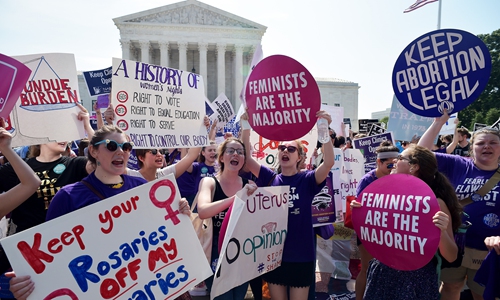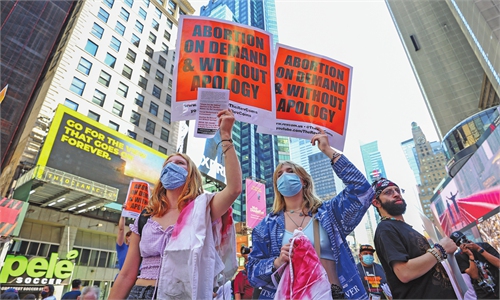US Supreme Court to hear abortion case
Biden Justice Department calls Texas Heartbeat Act ‘unconstitutional’

Abortion rights activists cheer after the US Supreme Court struck down a Texas law placing restrictions on abortion clinics, outside the Supreme Court in Washington DC, the US on June 27, 2016. Photo: AFP
Two months after refusing to intervene, the US Supreme Court is expected to hear challenges on Monday to a Texas law that bans abortions after six weeks of pregnancy and makes no exceptions for rape or incest.The nine-member court will listen to two hours of arguments by parties in a closely watched case with far-reaching human and political ramifications.
Texas, the country's second-largest state, is being sued by Democratic President Joe Biden's Justice Department and a coalition of abortion providers, accused of enacting abortion restrictions they say are "plainly unconstitutional."
Texas Senate Bill 8 (SB8) bans abortions after a heartbeat can be detected in the womb, which is normally around six weeks, when many women do not even know they are pregnant.
Laws restricting abortion have been passed in other Republican-led states but were struck down by the courts because they violated previous Supreme Court rulings which guaranteed the right to an abortion until the fetus is viable outside the womb, which is typically around 22 to 24 weeks.
The "Texas Heartbeat Act" differs from other efforts in that it insulates the state by giving members of the public the right to sue doctors who perform abortions, or anyone who helps facilitate them, once a heartbeat is detected.
They can be rewarded with $10,000 for initiating cases that land in court, prompting criticism that the law encourages people to act as vigilantes.
The framing of the Texas law has complicated the intervention of the Justice Department because of a principle called "sovereign immunity," said Mary Ziegler, a professor of constitutional law at Florida State University and visiting professor at Harvard University.
"The Eleventh Amendment of the US Constitution limits the circumstances under which states can be sued," Ziegler told AFP.
"The Supreme Court has carved out an exception that allows plaintiffs to sue to get an injunction when an official is enforcing a potential unconstitutional law," she said. "Texas says that under SB8, no official is theoretically allowed to enforce the law."
The Supreme Court was asked by abortion providers to block the Texas law when it took effect on September 1 but the court declined to do so citing "procedural issues."
Biden was among those who criticized the court for failing to tackle a law that "blatantly violates the constitutional right established under Roe v. Wade," the landmark 1973 Supreme Court ruling that enshrined a woman's legal right to an abortion.
AFP


